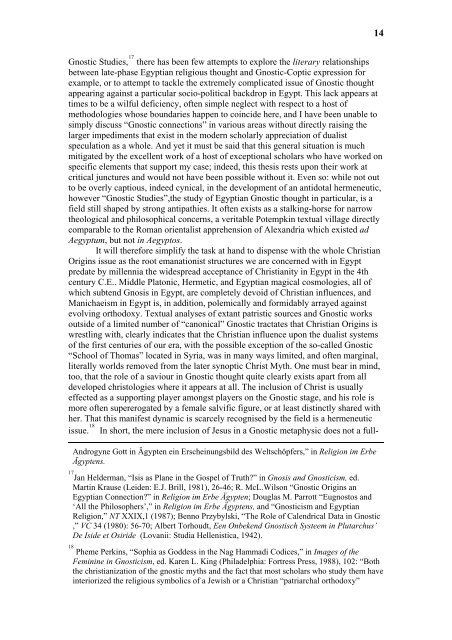THE EGYPTIAN FOUNDATIONS OF GNOSTIC THOUGHT
THE EGYPTIAN FOUNDATIONS OF GNOSTIC THOUGHT
THE EGYPTIAN FOUNDATIONS OF GNOSTIC THOUGHT
Create successful ePaper yourself
Turn your PDF publications into a flip-book with our unique Google optimized e-Paper software.
Gnostic Studies, 17<br />
there has been few attempts to explore the literary relationships<br />
between late-phase Egyptian religious thought and Gnostic-Coptic expression for<br />
example, or to attempt to tackle the extremely complicated issue of Gnostic thought<br />
appearing against a particular socio-political backdrop in Egypt. This lack appears at<br />
times to be a wilful deficiency, often simple neglect with respect to a host of<br />
methodologies whose boundaries happen to coincide here, and I have been unable to<br />
simply discuss “Gnostic connections” in various areas without directly raising the<br />
larger impediments that exist in the modern scholarly appreciation of dualist<br />
speculation as a whole. And yet it must be said that this general situation is much<br />
mitigated by the excellent work of a host of exceptional scholars who have worked on<br />
specific elements that support my case; indeed, this thesis rests upon their work at<br />
critical junctures and would not have been possible without it. Even so: while not out<br />
to be overly captious, indeed cynical, in the development of an antidotal hermeneutic,<br />
however “Gnostic Studies”,the study of Egyptian Gnostic thought in particular, is a<br />
field still shaped by strong antipathies. It often exists as a stalking-horse for narrow<br />
theological and philosophical concerns, a veritable Potempkin textual village directly<br />
comparable to the Roman orientalist apprehension of Alexandria which existed ad<br />
Aegyptum, but not in Aegyptos.<br />
It will therefore simplify the task at hand to dispense with the whole Christian<br />
Origins issue as the root emanationist structures we are concerned with in Egypt<br />
predate by millennia the widespread acceptance of Christianity in Egypt in the 4th<br />
century C.E.. Middle Platonic, Hermetic, and Egyptian magical cosmologies, all of<br />
which subtend Gnosis in Egypt, are completely devoid of Christian influences, and<br />
Manichaeism in Egypt is, in addition, polemically and formidably arrayed against<br />
evolving orthodoxy. Textual analyses of extant patristic sources and Gnostic works<br />
outside of a limited number of “canonical” Gnostic tractates that Christian Origins is<br />
wrestling with, clearly indicates that the Christian influence upon the dualist systems<br />
of the first centuries of our era, with the possible exception of the so-called Gnostic<br />
“School of Thomas” located in Syria, was in many ways limited, and often marginal,<br />
literally worlds removed from the later synoptic Christ Myth. One must bear in mind,<br />
too, that the role of a saviour in Gnostic thought quite clearly exists apart from all<br />
developed christologies where it appears at all. The inclusion of Christ is usually<br />
effected as a supporting player amongst players on the Gnostic stage, and his role is<br />
more often supererogated by a female salvific figure, or at least distinctly shared with<br />
her. That this manifest dynamic is scarcely recognised by the field is a hermeneutic<br />
issue. 18<br />
In short, the mere inclusion of Jesus in a Gnostic metaphysic does not a full-<br />
Androgyne Gott in Ägypten ein Erscheinungsbild des Weltschöpfers,” in Religion im Erbe<br />
Ägyptens.<br />
17<br />
Jan Helderman, “Isis as Plane in the Gospel of Truth?” in Gnosis and Gnosticism, ed.<br />
Martin Krause (Leiden: E.J. Brill, 1981), 26-46; R. McL.Wilson “Gnostic Origins an<br />
Egyptian Connection?” in Religion im Erbe Ägypten; Douglas M. Parrott “Eugnostos and<br />
‘All the Philosophers’,” in Religion im Erbe Ägyptens, and “Gnosticism and Egyptian<br />
Religion,” NT XXIX,1 (1987); Benno Przybylski, “The Role of Calendrical Data in Gnostic<br />
,” VC 34 (1980): 56-70; Albert Torhoudt, Een Onbekend Gnostisch Systeem in Plutarchus’<br />
De Iside et Osiride (Lovanii: Studia Hellenistica, 1942).<br />
18<br />
Pheme Perkins, “Sophia as Goddess in the Nag Hammadi Codices,” in Images of the<br />
Feminine in Gnosticism, ed. Karen L. King (Philadelphia: Fortress Press, 1988), 102: “Both<br />
the christianization of the gnostic myths and the fact that most scholars who study them have<br />
interiorized the religious symbolics of a Jewish or a Christian “patriarchal orthodoxy”<br />
14










